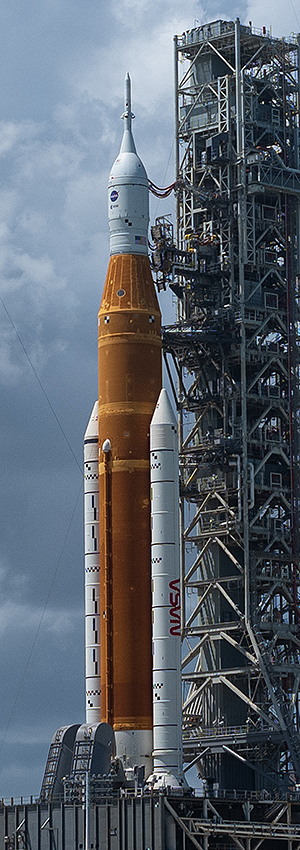 advertisements advertisements
|

|
Artemis I try two: NASA sets Saturday for 2nd attempt at moon launch
Artemis I mission coverage presented with the support of

August 30, 2022 — NASA will make its second try at launching a spacecraft to the moon on Saturday (Sept. 3), six days after technical issues forced a scrub.
The space agency is now targeting a two-hour window opening at 2:17 p.m. EDT (1817 GMT) on Saturday for the liftoff of its first Space Launch System (SLS) rocket carrying an uncrewed Orion capsule on a trip around the moon and back. The Artemis I mission is the first step in NASA's plans to return astronauts to the lunar surface before sending the first humans to Mars.
"We had a couple of challenges that we encountered that ultimately ended up in a scrub of the first launch attempt for Artemis I," said mission manager Mike Sarafin during a call with reporters on Tuesday. "We came back and reviewed the data from Monday's launch attempt and met today as a mission management team with our operations and engineering teams."
"[We] agreed to move our launch date to Saturday," said Sarafin.
On Monday, with about two hours remaining in the countdown, flight controllers saw data showing that the RS-25 rocket engines at the base of the SLS core stage were not cooling down to the thermal conditions required for launch (about -420 degrees Fahrenheit or -250 degrees Celsius) and one of the engines was notably warmer than the other three.
At the time it was thought that the issue was with the bleed of super-chilled liquid hydrogen from the core stage tank into the engines, but after reviewing the data, engineers now think it was a faulty sensor reading.
"What I'm telling you is the data on the ground side looked that way, but on the vehicle side, especially for engine three, it did not reflect that," said John Honeycutt, SLS program manager at NASA's Marshall Space Flight Center. "We understand the physics about how hydrogen performs and it's not the way the sensor is behaving. It doesn't line up with the physics of the situation."
Replacing the sensor at the launchpad would be "tricky" according to Honeycutt, so the plan is to instead move the chill down to earlier in the countdown when the engines are at ambient temperature and use the data collected from Monday's attempt along with data from other sensors on the vehicle and at the pad to decide whether it is safe to proceed with the launch on Saturday.
Unrelated to the engine issue, engineers will also use the time this week to repair a tail service mast umbilical at the launchpad that leaked hydrogen on Monday.
With regards to the weather outlook, the forecast calls for a 40 percent chance of favorable conditions during the launch window on Saturday.
"I'm optimistic that we'll have at least a some clear air to work with during the afternoon attempt on Saturday," said Mark Berger, launch weather officer with the U.S. Space Force's 45th Weather Squadron. "However, the probability of weather violation at any point in the countdown still looks to me rather high just given the moist airmass and batch of showers coming in off the ocean."
If weather scrubs the launch, NASA could try again on Monday (Sept. 5).
"Assuming that it's a weather scrub and we're not looking at any kind of technical issues, it's just a commodity turnaround and we could be ready as soon as 48 hours," said Artemis I launch director Charlie Blackwell-Thompson.
If the launch goes forward on Saturday, the Artemis I mission will extend just three minutes shy of 38 days, ending in a splashdown in the Pacific Ocean at 2:10 p.m. EDT (1810 GMT) on Oct. 11. |
|

NASA's Space Launch System (SLS) rocket and Artemis I Orion spacecraft are seen atop Pad 39B at NASA's Kennedy Space Center in Florida, Tuesday, Aug. 30, 2022. (NASA/Joel Kowsky) |
collectSPACE is grateful to film and TV company Haviland Digital for supporting our Artemis I coverage. Their team has produced and supported titles such as the award-winning "Last Man on the Moon," "Mission Control: The Unsung Heroes of Apollo" and "Armstrong." |
|

© 1999-2025 collectSPACE. All rights reserved.
|
|

|

|
